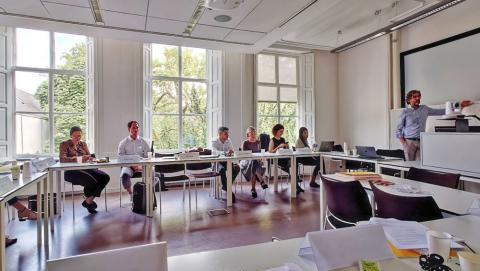IMOBEX
Improving enforcement at the intersection of mobile banditry and exploitation (IMOBEX).
The content of the IMOBEX-webpages represents the views of the authors only and is their sole responsibility. The European Commission does not accept any responsibility for use that may be made of the information it contains.
Results of the IMOBEX-project available
The outcomes of the IMOBEX-project have been reported in four publications, which are now publicly available. Links to the reports can be found at the publications page.
Mobile banditry - project description
Mobile banditry is a classic type of organised crime that increased again in Europe after the fall of the Iron Curtain in 1989 when groups originating from Eastern and Southeast Europe started to commit crimes such as vehicle theft, burglaries, shoplifting, skimming of debit and credit cards, and fraud across Europe. Criminal groups in other countries rapidly copied their methods and developed their own similar strategies. Itinerant groups may or may not reside temporarily in the area where they commit crimes, making use of a support infrastructure of relatives and accomplices who provide housing or help to fence stolen goods, and often operate in countries’ border areas to avoid detection.
Human exploitation
Law enforcement agencies regularly observe that perpetrators responsible for committing the riskiest handwork are forced to do so. Financial debts often play a role, for instance in the context of human smuggling and gambling, but also dowry repayments. Exploitation is also relevant when minors are involved, for instance for shoplifting and begging. Not surprisingly, perpetrators who commit the riskiest activities, i.e., the actual property crimes, are the first – and often the only ones – who get caught, and it is often difficult to assess whether they are rational actors who choose to offend, or instead are victims of human trafficking.
Finally, the perpetrators often come from closed, badly integrated and often economically deprived communities, particularly the Roma community. Mobile banditry at the intersection of exploitation poses complex challenges to law enforcement agencies in terms of detection and information exchange with foreign counterparts and relevant agencies at home.
Outcomes of the project
The aim of IMOBEX is to enhance EU policies and operational law enforcement actions in the 27 Member States and 7 Southeast European third countries to combat property crimes at the intersection of mobile banditry and human trafficking. The project aims to develop novel investigation methods, address training needs, and enhance cross-border and multi-agency cooperation.
The project should thus benefit a wide range of stakeholders by improving and disseminating knowledge about modi operandi and enforcement problems at the intersection of mobile banditry and human trafficking; developing creative and feasible interventions for enforcement agencies; developing a roadmap to close the gaps at national and EU levels in the legal and policy infrastructures; addressing the dilemma of dealing with perpetrators who are also victims of human trafficking for criminal purposes; and promoting, in the long term, preventative effects of better inclusion of the socially and economically deprived communities from which itinerant criminal groups often originate.
The outcomes of the project may be applied by enforcement agencies in EU Member States and 7 Southeast European third countries (Albania; Bosnia and Herzegovina; Moldova; Montenegro; North Macedonia, Serbia and Turkey), as well as by Europol, SELEC, and other international enforcement agencies and cooperation networks. Furthermore, it will provide guidelines to policy makers of the EU, the EU MS, and third countries.
IMOBEX Seminar held in Utrecht, the Netherlands
An important part of the IMOBEX-project is to develop intervention strategies as well as actions to overcome gaps in the legal and practical infrastructure to combat mobile banditry at the intersection of criminal exploitation. These were discussed in-depth during a two-day workshop hosted by Utrecht University on 6-7 July 2022.

The meeting was attended by 20 participants coming from a selection of member states and European third countries. These included representatives of law enforcement agencies and NGOs from Germany, Lithuania, Romania, the Netherlands and Serbia, as well as representatives of the IMOBEX-consortium. Participants’ presented challenges from the perspective of law enforcement, cross-border and multi-agency cooperation, legal definitions of criminal exploitation, and victim support.
Overcoming these challenges requires actions at different levels. Examples are raising awareness that Organised Mobile Crime Groups (MOCGs) inflict substantial damage in both countries of origin and destination, and adequate resources should be allocated to disrupt their activities. Tackling the problem requires close multi-agency cooperation between public partners as well as with private partners, which is currently highly difficult because of GDPR requirements.
The EU should therefore in the short term take action to create such a legal basis for information exchange and promote the role of Europol to enable swift exchange of data. From a long-term perspective, the root-causes of mobile banditry should be addressed. On the one hand, this concerns the persistent large economic inequalities within the EU, that contributes to opportunity structures for MOCGs and targeting of vulnerable victims, and on the other hand the existence of isolated and impoverished communities, Roma in particular, which present risk factors. Deliverables 3.1 and 3.2 present the results of this part of the project.



